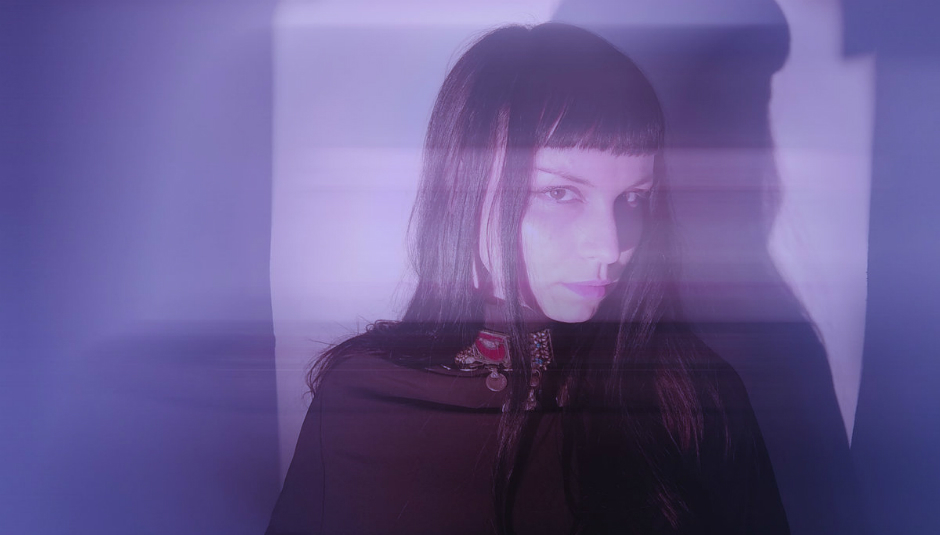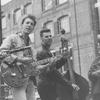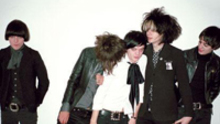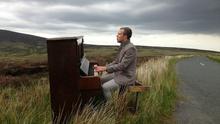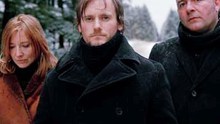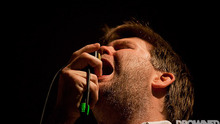“Jesus said he’d forgive me, but I couldn’t feel it. All I could feel was empty shells of feeling.”
Living in emptiness doesn’t just have to be the outcome of an extinguished soul. It can potentially be a launching-off point for personal rediscovery. Such is the case for Irish artist Hilary Woods. Her album Colt – though constructed with the sparse palette of voice, piano, synths, and electronic beats – has the quality of a recently exhumed anachronism ready to be repurposed.
Like strange phantom appendages, previously malnourished emotions stretch and recoil at their own desired pace and direction within a dim and crepuscular firmament. And becauseColt’s sonic makeup sounds so diffused and gaunt, any indication of obvious stylistics or reference points is obscured. ‘Jesus Said’, one of Colt’s standout tracks, is a prime example: the track begins as a dirge in the vein of The Future-era Leonard Cohen, onerous and bellowing, only to subsume into a stark techno-inflexion. “’Jesus Said’ was a very intuitive song,” Woods elucidates over Skype. “It was recorded very early on in the process. I layered samples of beats. The finished song on the album is very similar to the earlier incarnations. A lot of the piano parts were improvised, and then when I went back to redo them, the new parts didn’t have the same essence, the same feel. So I used the first takes.”
Throughout a small hour of chatting, Woods and I tiptoe around each other, exchanging shy laughs and delphic reflections. The subject wallowing in the midst of us, Woods' music, seems almost too candid to tackle full on. And maybe that’s a good thing. The unfinished quality of Colt is a significant part of its cogency. “I don’t know, certainly not consciously. To me, Colt is almost like a bedroom record. I felt it was intensely personal, almost private, so it wasn’t meant as a statement to any collective.”
The record occupies an ambiguous space: too foggy and unprocessed to be considered outright dystopian, yet its minimalist instrumentation stops the music just short of Aleister Crowley-esque pastoral goth splendour. Though conceived in a prosaic urban space, Colt evokes a longing for folkloric, hymnal pastures. Woods is a big fan of Iris Murdoch’s literary works, and later namedrops Valerie And Her Week Of Wonders as one of her favourite films, which makes sense, as both merge surrealist beats with kitchen sink humanity.
DiS: I love the artwork of Colt. It’s such a striking extension of the music, and the sense of distance and eeriness it evokes. Who took the picture for the artwork?
Hilary Woods: I did all the artwork myself. It just felt natural. I took a lot of photos, and I knew it was going to be photography. It was just an instinctive thing. When it came to the cover, I had proposed similar colouring on blue polaroid on film, and the label (Sacred Bones) loved it.
It does fit the aesthetic of the record. Very much alive, but also like it’s been around since ancient times. I’m wondering what your relationship is with folk music and folklore.
I don’t know. You mean regarding a mystical, folkloric aspect? Like folk music? I consider a lot of things folk – I respect a lot of folk artists, and I’m always drawn to good lyrics. I love Bill Callahan for instance. A lot of my songs start on guitar or piano – mainly piano – but the lyrics always come to be pretty soon, they are an innate part of the conception of the song. So in that sense, that’s a sort of folk thing. The lyrics are a central part of it.
I read that you’re going to play in a cemetery with Grouper.
Yeah, I was asked to play about a month ago, and of course, it’s a very prestigious gig to play, and one that’s entirely up my street. I feel very honoured, and I’ve never played in the cemetery.
What’s your relationship with burial?
I think it’s a sensitive issue. I have family members that have been both buried in a grave and cremated. It’s very final. I think they’re places of reflection, they are poignant places. They can be at least. People would like to be buried someplace beautiful, like in Bantry country, a wuthering heights land, something romantic. But the reality is, a lot of people are buried in empty plots that are kind of depressing, somewhere in the outskirts of the city.
It’s weird ‘class’ thing too. Jim Morrison is buried in this majestic grave in Paris, Whereas in war-time mass funerals, every victim is sort of buried the same way.
That can be quite upsetting. But I have family members who are buried in lovely plots. I have never really thought about it, but now that you bring it up, I do have a lot of feelings about it. Like for instance, my dad isn’t here anymore, and I still remember how he bought his own grave, and he came home and he told me that. He was almost laughing about it. I mean, what else can you do?
Outside of your records, you have also composed horror scores and explored projects of sound design. What did it entail exactly?
I haven’t done a lot, it was more quality over quantity. Last year I did some scoring on a piece that was part of a film during a festival over here. That was interesting, I played it live, which was the first time, and it was packed cinema, I was at the front with all my pedals and electronics. I’m aiming to do more of that. It was just one of those surprise offers, it came to me as opposed to me looking for it. And I made some theatre from sound design, which was a live process. I wouldn’t want to do something unless it spoke to me or made sense, because inevitably, you put a lot of time and devotion in these projects. It’s like a meeting.
How have you developed your music on stage these past few months?
At the moment I’m doing solo shows, they are working out well. The songs have taken on a new life because I haven’t tried to replicate the record. They have been tailored, some of them are stripped back, others are layered up.
You’ve described your love for dance in numerous interviews. Not to call you a dancer per se, but have you thought about your presence on stage as an extension of the music? How are you communicating that aspect?
I was asked recently in an interview what I wanted to be early on, and I said I wanted to be a dancer. And as interviews go, we talked a little bit about that. I guess when I was little I loved to dance. I still do. But translating it in my music? I just don’t think it’s visible in any noticeable way. But I don’t know how musicality has to be embodied as a dancer. So I don’t know how to answer this question.
I guess I meant the idea that you are not just playing the music, but also experiencing the music as you perform. Your reaction to that experience always communicates something.
That’s tricky because I never really thought of myself as a performer. Even when I danced a lot. Performance and music require a different headspace. But it’s a muscle that I want to strengthen. And it takes practice. But Colt is quite introverted and performing it live, I’m just looking forward to touring, so I can get into the mojo of the set a little bit more.
I’m not going address your stint in JJ72, because I think that’s been pretty well covered. But the comedown of that, psychologically, how did that affect you in the beginning, you know, slowing things down a bit again?
I was very happy to leave, so a lot of relief initially. There was a lot of pressure on me to stay in the band. But I felt that I made the right decision, I was happy to have the time to be able to explore my own thing. So psychologically I was very well. Maybe the very opposite of what people might have thought, because I was told I was crazy: why wouldn’t I want to stay?
You know, there is this dilemma, being in a band at such a young age, seeing the world and playing all these venues. That’s a headstart in mileage. But did the lack of creative agency grate at you a bit?
Yes, but it would grate at anyone really. It was all very busy, but for me, it was a matter of time, because I knew it was more important to stay invested in what I wanted to do myself. If you don’t feel creative in that band environment – which is what it was supposed to be – you have to follow your impulses. But it was eye-opening, I learned a lot you know, especially about studio work.
I imagine, that once you grasp the many inner workings of this industry, it inspires you to quickly set your terms from within.
A lot of people don’t know what they want, but they certainly know what they don’t want. I knew I wanted to explore my own artistic path, but I would only go back into music if I knew I was comfortable with it. Back into the same zeitgeist, you know? Because I don’t feel very comfortable with it. I’m much happier doing my own thing. The most important thing is to let your creativity lead the way.
The power of suggestion is a constant in this album. In many ways, this can be more potent than revealing things in absolute detail. ‘Sever’ bares that sense of dread, the feeling of pushing out of some toxic situation, but in the most understated sense.
‘Sever’ posed a lot of challenges, what you hear on the record is very stripped back and bare, it certainly didn’t start like that. It was the song that changed the most in the process of the record. There’s dread there, yeah; the song is addressing something complicated in a very sparse way. It doesn’t say much but it implies a lot. I felt vulnerable putting it out. I felt a lot of things.
A lot goes into making a record, and the music is the main component. Every record has a character, how you are feeling at that particular time. How in touch you are and how easy or hard it is to carve out time to create. All those things have an impact on the result of a record. I was happy to record this at home. And in many ways, it was something I really looked forward to making every day. Even though I wasn’t always in the best of situations.
That reminds me. Recently, I stumbled onto this exchange between Low and EMA on Twitter, and Alan Sparhawk said something about certain bands giving him an inherently optimistic view. When he mentioned EMA’s music, she responded by saying there was a triumph in her music, even if people only choose to see the darkness.
I think it’s a good thing as a writer or artist, to address whatever needs to be addressed. And if that’s the darkness, then so be it. I think the act of addressing darkness is inherently optimistic. It’s responding to something, and that means engaging with something that needs to be engaged with. So no, I don’t break it in two, the line between darkness and light.
Colt is out now via Sacred Bones. Hilary Woods will perform at the annual Le Guess Who? Festival in Utrecht on November 9. For more information about her, please click here.
Photo Credit: Joshua Wright

